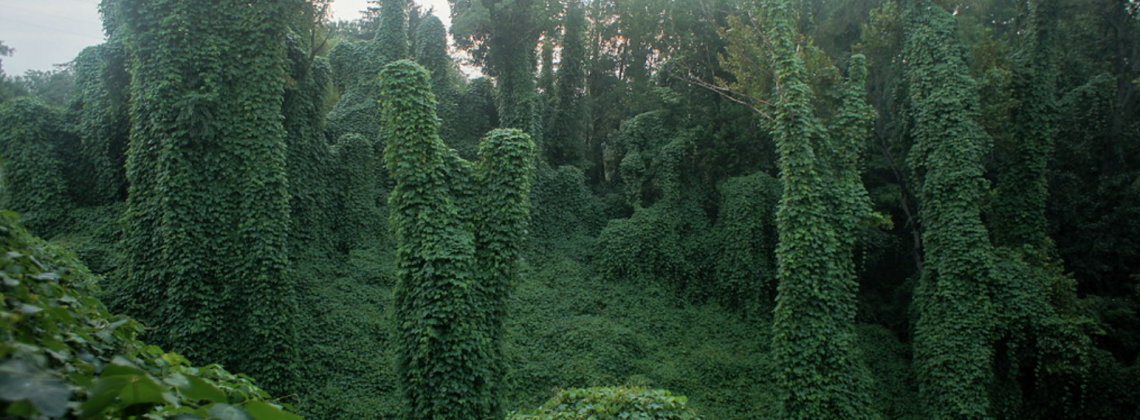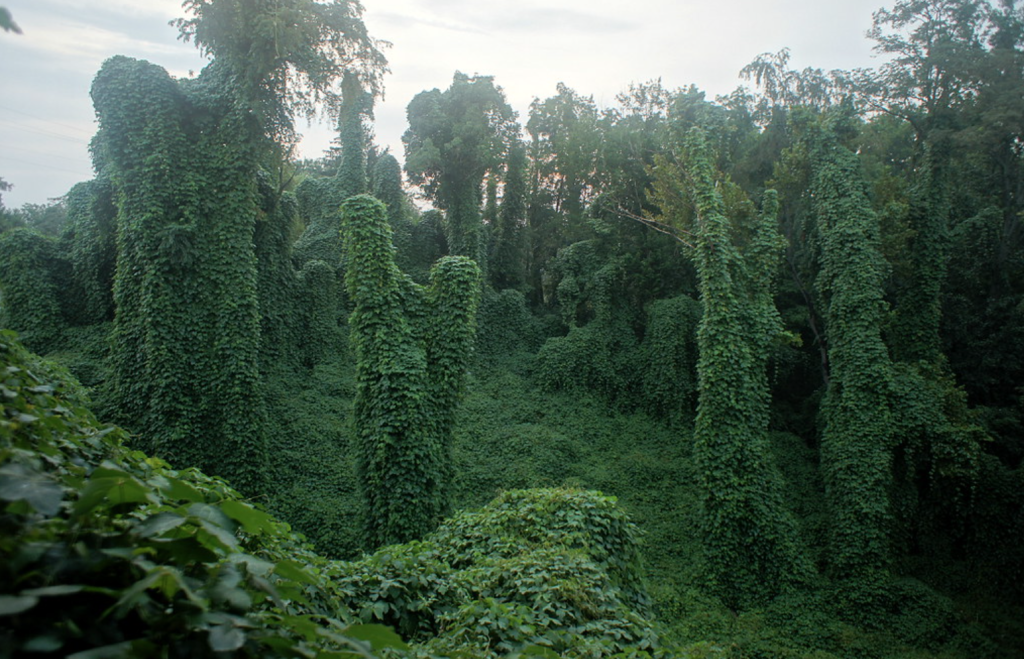

James Dickey gives one writer’s fears a local habitation and name
I had visited the South twice as a child and had attended college on Lookout Mountain, Georgia for four years, so I had some familiarity with the region before 1983. But things changed when my wife and I—both Northerners—bought a house here, expecting to spend the rest of our lives in Chattanooga. I must have noticed kudzu during my college years, but my first vivid, memorable experience of kudzu only occurred after we purchased our first house in Chattanooga.
The house was set on a wooded acre, vacant lots on either side. Long neglected, our house had almost no yard; the surrounding woods had encroached on what had been a lawn. After a summer of backbreaking labor, we managed to extricate the house from the wilderness, creating a civilized clearing all around the house.
Kudzu was by far the most difficult weed to control. Though we felt that we had conquered it, we soon learned that kudzu grows very quickly in hot weather (as much as a foot per day!). We could cut it back, create our open, safe space, keep it off the house, but only for a short time. Whenever we went away for any length of time, even just for a week’s vacation in the summer, it would take over much of our hard-earned lawn.
We soon learned that cutting it back was not a solution. What did work, finally, was pulling each individual vine deep into the adjoining woods and winding it around trees. That kept it in place, away from our little patch of civilization. However, there were consequences to that strategy. As the kudzu grew around and up the trees, it eventually killed them. We were not eradicating the plant; we were just moving the problem a few feet away. Kudzu still unsettled us, for as we looked out our windows, sat on our porch, or walked about our lawn, it was always visible, making the trees in the vacant lots look, as James Dickey wrote in his poem “Kudzu,” “Like things smothered by their own / Green, mindless, unkillable ghosts.” It reminded me that we were not living in harmony with nature, perhaps just experiencing a very shaky truce with it.
I divide disasters into two clear categories: 1) natural disasters, like hurricanes, and 2) man-made disasters, like the bombing of the World Trade Centers. The disaster of kudzu that we in the South confront is interesting—and bedeviling—because it is both natural and man-made. In the 1930s when kudzu was initially promoted by the U.S. Soil Conservation Service, it was seen as a natural solution to a man-made disaster: soil erosion. Humans had disturbed the soil, made it unstable, and created a huge mess. Kudzu could keep the soil in place, and it did. Problem solved. But the solution became its own problem, and the solutions that have been tried in my part of the South have not been roaring successes. In fact, as with other natural disasters, perhaps the best we will be able to do is to learn to live with it as best we can.
The physical consequences of the kudzu invasion are bad enough, as it effectively destroys whole forests, but for me much worse is its psychic toll. Kudzu alienates me from the natural world I love by defamiliarizing it. Dickey describes this beautifully when he writes that the kudzu makes telephone poles and trees look “As though they would shriek / Like things smothered by their own / Green, mindless, unkillable ghosts.” I cannot tramp through a kudzu-infested forest as I tramped through the forests of my childhood and youth. It looks creepy, so I avoid it. If I decided, in spite of my revulsion, to walk through the wood, the vines would entangle themselves about my legs, making it almost impossible to progress effortlessly through the wood.
Kudzu presents another challenge for me. It creates a very welcoming environment for snakes—and snakes are perhaps the thing in this world that I fear most. Dickey puts his finger precisely on the fear I experience in a field of kudzu: “you cannot step upon ground: / Your leg plunges somewhere / It should not be, it never should be / Disappears, and waits to be struck / Anywhere between sole and kneecap.” He adds, “For when the kudzu comes / The snakes do, and weave themselves / Among its lengthening vines.” It’s not just the pain a snakebite would cause that unsettles me. It’s the uncertainty and the anticipation of a possible attack that makes this part of the natural world alien to me. I cannot feel completely at home in a world with kudzu.
My experience with kudzu and Dickey’s poem, “Kudzu,” raises a serious question for me: Why would I spend so much time with a poem that vividly reminds me of a phenomenon that unsettles me? Why teach it every year for my thirty years at Covenant College, become so familiar with it that I can almost recite it from memory? The obvious explanation is that Dickey created a powerful piece of literary art. Dickey’s skillful use of language, particularly his use of simile, enhances my pleasure in being alive, makes me more aware of the great gift language can be in the hands of a skillful writer.
It is more than that, though. My experience with “Kudzu” helps me deal with this disaster, kudzu, better than I could without it. Let me use a personal example to try to explain why I find this poem so useful. From very early in our marriage my wife began to have unexplainable swelling episodes. Most of them were merely uncomfortable, but others were quite disturbing and even extremely painful. I cannot remember how many doctors she consulted about this condition, all to no effect. After suffering for more than ten years, she met an allergist in Chattanooga who told her he thought she had a condition called “Hereditary Angioedema.” For both of us—even before we knew there was treatment—there was a kind of comfort in the fact that she now had a name for her condition, and the naming brought something almost like control.
I think my experience with Dickey’s poem is very similar. He gives me language to describe—or at least hint at—what bothers me about kudzu. I understand my feelings when I encounter this vine better because I have studied the poem. Dickey’s poem does not solve my issues with kudzu, but it has helped me connect it with other alienating experiences in my life. It has given me a name that makes my anxiety in the face of disaster easier to bear.
Jim Wildeman is a novelist, short story writer, and professor emeritus at Covenant College in Lookout Mountain, Georgia. He lives in Chattanooga, Tennessee.